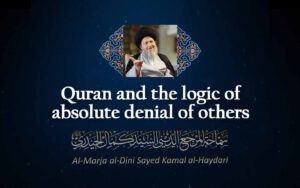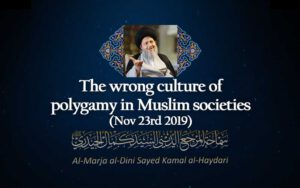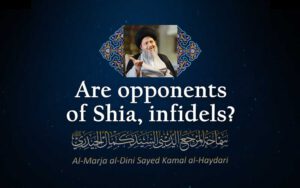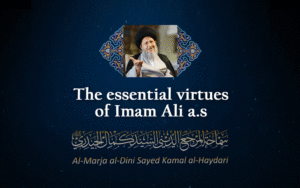2518 words, approximate reading time 19 min
What acts are permissible in the month of Muharram?
After proving from the Qurʾan and narrations that the days attributed to Imām Ḥusayn (a.s) are in fact Ayyam allah (The days of Allah), a question arises regarding what acts to perform in this month and how to observe and commemorate these days.
وَذَكِّرْهُمْ بِأَيَّامِ اللَّهِ (Quran 14:5)
And remind them of the days of Allah.
The answer is that the Ahl al-Bayt have themselves taught us what to do in these days. We need to look at the extensions set by the Ahl al-Bayt to the Ḥusaynī and divine rituals for us.
One of the important acts that the Shias must do in these days as stressed in clear narrations is to hold mourning ceremonies and remember the tragedy that befell the chief of martyrs. Some other narrations point towards how to mourn and what acts to perform as “Godly rituals”.
Acts like crying, mourning and remembering the pain and tragedies faced by the companions of Imām Ḥusayn (a.s) in Karbala are a part of them.
Moving on from this introduction, a very fundamental question needs to be answered. Are we allowed to add acts of mourning of our own, apart from those mentioned in the reliable narrations?
For example, does anybody have the right to make animal sounds (bark like a dog), walk like animals, hit himself with a sword and cut his and a six month old kid’s head or throw himself in a pool of mud, walk on fire and thorns or throw himself before horses and such things in the name of Ḥusaynī rituals?
In other words, now as the Ḥusaynī rituals are being considered a religious act, do we have the right to innovate and add new extensions to our own temperament and taste apart from what we have been told by the Ahl al-Bayt!? For example, can we offer the daily prayers as we like ourselves or do we have to stick to the way the Prophet taught us to pray?
صَلّوا کما رَأَیتُمُونِی أُصَلّی
Pray as you have seen me pray. (Bihar ul-Anwar, v 82, p 279)
Is determining the extensions to religious rituals during Muḥarram, Tawqīfī (a ruling which depends solely on the Shariah and human intellect has no role in defining that) or non-Tawqīfī? Meaning, are we allowed to do only those acts in mourning as directed by the Ahl al-Bayt, or are we allowed to add to it too? A scholar, jurist or Marjaʿ must make his stand clear regarding these issues. He must bring forth an argument to prove the Tawqīfī or non-Tawqīfī nature of these new acts. If someone argumentatively proves that these acts are Tawqīfī, then a lot of acts that are done today and were not performed by the Ahl al-Bayt will basically become void of value and considered to be innovations or Bid’ah.
Based on this, since none of the Imāms have ever hit themselves with swords, nor have they ever advised anyone to do so, Taṭbīr (self-flagellation) is an innovation in the religion and thus Haram (Forbidden)! That is, every act whose authenticity cannot be proven from clear and reliable religious texts is like a red line and crossing it (acting on it) is Haram (Forbidden).
Conversely, if someone says that the mentioned acts by the Ahlul-Bayt, like crying and mourning are just some extensions and thus it is permissible to add newer extensions, he in fact believes in the non-Tawqīfī nature of the Ḥusaynī rituals.
What are criteria to determine extensions to the religious issues and Ḥusaynī rituals?
In answer to the non-Tawqifī approach and considering it to be correct, if someone believes in it, it is necessary to put forward a very important scientific and jurisprudential point:
Determining extensions for religious issues are of two kinds:
1: The first kind are those individual matters which concern the man as an individual. For example, the Shariah has not determined the extensions in the case of the obligation of paying sustenance for the family and has referred it to the social customs, which means that it has been left to the person so that he chooses what he feels is correct from the social customs and acts upon it.
2: But the other kind has a general and all-inclusive application and is related to religious and social matters and not individual matters. Considering these two types of extensions, the question is that are Ḥusaynī rituals personal issues or issues related to the entire school of thought? The answer is clear. Since, Imam Ḥusayn a.s is the symbol of the Ahl al-Bayt’s school of thought in the Shiʿah culture, issues related to him are related to all Muslims, not an individual or a particular creed.
Now that it is clear that issues related to Imam Ḥusayn a.s are general religious matters, let me add that determining extensions for commemorating these days in the name of Ḥusaynī rituals must fulfill three basic and important criteria and conditions, otherwise they certainly will be an example of innovation and superstition.
First criteria: being consistent with the general religious thought system:
The first condition is that any extension and example of Ḥusaynī rituals needs to be consistent with the value system of Islam and Ahl al-Bayt school of thought. It must not oppose any of the main principles of Islam and contradict it. Islam is a religion whose every component is in complete harmony with all other components and all of them are interdependent. Nobody can perform an act without paying attention to the other dimensions of Islam. Islamic Jurisprudence (Fiqh) has to be consistent with Islamic ethical system and the ethical system has to be consistent with the Islamic thought and belief system. Therefore, it is the duty of a religious scholar to see whether a particular act that is performed by a limited group of people- like making barking sounds- is consistent with the basic Islamic missionary principles or not!?
Second criteria: Consistency and coherence with Imam Ḥusayn’s mission:
The second criteria regarding extensions of Ḥusaynī rituals is that those acts must not be in contradiction with the mission for which Imam Ḥusayn was martyred! If the lovers of Ahl al-Bayt start doing things that are against the main aim and mission of the chief of martyrs, there is going to be a violation of purpose and they will be opposing their own master with their actions. For example, one of Imam Ḥusayn’s aims was to fight oppression and despotism. So, if someone does something that helps and benefits the oppressor, he must give that act up, otherwise he will be fighting oppression in a virtual world with his slogans but practically, knowingly or unknowingly, he will be strengthening them.
Third criteria: Being harmonious with the time and place conditions:
The third criteria when determining extensions for Ḥusaynī rituals is that they should be harmonious with the time and place constraints along-with being consistent with the religious thought and Imam Ḥusayn’s mission. A person should see if his actions are really in harmony with the geographical, social and cultural conditions in his times or not?
Although it is the duty of a Mujtahid and Marja’ to determine these issues in the first place. Also, we do not consider only a Mujtahid in Furū al-Din or jurist as a Marja’ but instead, he should be an expert and Mujtahid in Usūl al-Din as well as Furū al-Din. Added to that, he must be aware of the needs of the time and political, cultural and intellectual conditions.
For example, it is not Harām if a person dresses in a centuries old attire, but he will definitely be laughed at in the present circumstances. To speak more precisely, it is very important for every action that is done in the name of Ḥusaynī rituals to consider the circumstances and time and place conditions and this means interference of these circumstances in the way of expression of religious rituals. The jurist who does not understand the conditions, needs, norms, values and taboos of his own time, is not a real jurist and his rulings (Fatawās) are not accepted by the society as they are not consistent with its values.
Therefore, any act that does not fulfill all three of these conditions is not only unsuitable to be called a religious ritual, but is also an innovation in religion and doing it is Harām.
Who should determine the extensions of Ḥusaynī rituals?
After explaining the criteria, now it is time to ask does everybody have the right to determine the extensions of the Ḥusaynī rituals based on the above-mentioned conditions? Does every poet, elegy reciter, speaker or mourner have the qualification to give an opinion on such an important and sensitive issue?
Does every other Shaykh, who speaks on satellite channels and internet, with every qualification, have the right to give a Fatwa and add new rituals to what the Ahl al-Bayt have taught us according to his own taste?
The answer is that according to me, the only authority on this issue are the religious seminaries, Maraje’ and religious scholars (we mentioned earlier that according to me everybody who knows jurisprudence is not a religious scholar, he is just a jurist. People should know that there is a difference between a scholar of jurisprudence and a religious scholar. Only a person who is an expert in all fields of religion- both Usūl and Furūʿ can be called a religious or Islamic scholar).
I do not claim that every innovator and proponent of superstition has an evil intention or all of them are in contact with foreign intelligence agencies but what I want to say is that a lot of common people and public speakers might do such acts with pure intentions and out of their love for Imam Ḥusayn a.s, yet, since they do not have enough knowledge, they invent and innovate new acts in the name of Ḥusaynī rituals that are in contradiction with the above mentioned criteria. When religious scholars and ʿUlama don’t discuss these issues and stay silent in the face of these wrong acts, clearly those people who are not qualified enough for this sensitive responsibility will take their place and these problems that we see today, arise.
The religious seminaries, especially the Ḥawza of Qom and Najaf including the Marajeʿ Taqlīd have a huge responsibility in this matter and they must not remain indifferent to this issue; otherwise, these malpractices are going to increase and the act of mourning for Imam Hussain will appear ugly and repulsive.
My only aim in putting forth these criteria and discussing this issue is to make Imam Ḥusayn’s revolution and his heroics- a revolution which has been derailed from its real track and whose constructive nature has been harmed by superstitions and innovations and acts that have no justification in the Quʾrān, Ḥadīth and intellect- be displayed in a more beautiful manner.
Referring to the Ḥadīth (narrations) or its narrators (the
scholars)?
Someone might ask why we are stressing so much on the religious seminaries
and religious scholars in this matter. Why do we consider it to be their duty
to play a leading role in this issue?
The answer lies in this famous and reliable Ḥadīth:
وَ أَمَّا الْحَوَادِثُ الْوَاقِعَةُ
فَارْجِعُوا فِيهَا إِلَى رُوَاةِ حَدِيثِنَا فَإِنَّهُمْ حُجَّتِي عَلَيْكُمْ وَ
أَنَا حُجَّةُ اللَّهِ عَلَيْهِمْ
(Wasai’l Shiʿah, v. 7, p. 140)
Unfortunately, a fallacy and mistake exist regarding this Hadith which we
need to address!
We are speaking about the phrase –فَارْجِعُوافِيهَا إِلَى رُوَاةِ حَدِيثِنَا . The Imam tells us to refer to the narrators of the Hadith or the qualified jurists (Mujtahid in both Usūl and Furūʿ) not the narrations! During the occultation, you must refer to the religious scholars so that they explain the correct meaning of the narrations.
Any other person cannot read a Ḥadīth from any book for the people and act on it. Identifying and acting upon Ḥadīth has its own set of principles and rules that are not known to everybody. In the mentioned narration, the Imam says, فَإِنَّهُمْ حُجَّتِي عَلَيْكُمْ – the scholars are our argument on you. Imam did not say فإِنَّها حُجَّتِي عَلَيْكُمْ as the pronoun used here does not refer to the narration itself. It is the way of the Akhbarīs to hold a book in their
hands, read it out and ask people to act on it without even checking the
reliability of the Hadith and reviewing their chain of narrators and content by using methods like comparison with the Quʾrān and basic intellect.
Attracting people with which image of Islam: an intellectual Islam
or a violent and illogical Islam?
We need to understand that the enemies of Islām, Quʾrān, the Prophet and Ahl al-Bayt try to portray a violent, superstitious and illogical picture of Islam to the world. On one hand, they portray Sunni Islām as a violent and repulsive creed by creating groups like Al-Qaeda, Al-Nusra and ISIS and on the other hand they propagate a version of Shiʿah Islām that shows an ugly and illogical picture of Shiʿah Islam.
Although I have no intentions to discuss whether our enemy has or has not
created a particular creed or a person in the Shiʿah, I just want to say that we must not allow innovations, superstitions and wrong, illogical and unnatural acts to deface the beautiful and illuminating face of Islām and Shi’ism.
Instead, we must present a reading of Islām to the world that attracts the
human intellect, nature and reason towards itself.
It is completely clear that no logical human being can accept the violent, wild, terrifying, illogical and unnatural picture of Sunnism that is presented by ISIS.
The responsibility of Maraji’, religious institutions and mourning committees in saving Ḥusaynī rituals!
I end this discussion with a very serious address to three groups, in order that they stand against these innovations and wrong acts that have nothing to do with the Quʾrān, Ḥadith, intellect and Fitrah. The silence and introversion of these groups should not allow these acts to flourish and ruin the face of religion and Shi’aism.
The first group are the Ḥawzas of Qom and Najaf and in fact, the Maraje’ and religious scholars who are responsible for stopping these incorrect and destructive acts according to the above mentioned three criteria, or any other criteria that they deem to be correct themselves.
The second group are the religious institutions, educational and research centers and universities who have the responsibility to educate the Shi’as about this issue and elevate their level of information on the issue and work to realize Imam Ḥusayn’s real mission instead of getting involved in innovations and tertiary issues.
The third group are the mourning committees and Ḥusayniyyahs who should not allow such acts to take place in their environments because everybody must know much these activities like hitting the head with swords, walking on thorns and fire, making animal sounds and walking like them harms Islām firstly, secondly, tarnishes in image of Shi’ism and the Ahl al-Bayt school of thought and thirdly, undermines the goals of Imam Ḥusayn’s great revolution and reduces its constructive value.



